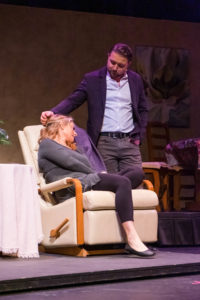Preview: Lessons for the heart: Valley Players present ‘The Tin Woman’
Napa Valley Register Review by John Henry Martin Feb 26, 2020
If you had an organ transplant, would you want to know the donor? What if the donor had died unexpectedly, say, in a car crash? Would you want to contact the donor’s family? If so, what would you say?

This is the issue that is explored in Valley Players’ production of “The Tin Woman” opening at Lincoln Theater Friday, Feb. 28.
When the play begins, Joy, played by Bridget Folan, has just had a heart transplant. She’s in the hospital trading barbs with her nurse, played by Christine Cawley, who doesn’t get her sarcasm. We quickly get the sense that while Joy’s biological heart has been transformed, her spiritual heart is withered.
The donor of the heart is Jack, played by Walter Hamlin. Jack died in a car crash right after an argument with his father. His mother Alice, played by Valley Players regular Patte Quinn, and father Hank, played by Dan Monez—a familiar face on most Napa Valley stages—are still grappling with the sudden death of their son. Jack’s sister Sammy, played by an ebullient Paige Whitney-White, grieves with them.
While Jack’s body may be gone, he has not departed. Hamlin, as Jack, haunts every scene. It’s a brilliant bit of stagecraft that Hamlin plays perfectly. He is an actor with no lines and responds to what happens, say, an argument between his parents, by flopping petulantly onto the couch. Or, he hovers over Joy like an angel as she sleeps in her recliner. With a furrow of his brow or the cock of his head, he offers a voiceless, but poignant, commentary on the other actors’ tribulations.
The argument Hank had with Jack before the lethal accident looms large in Hank’s memory. His grief takes the form of a curmudgeonly, and sometimes hysterical, simmering pot of regret, anger and bourbon. Alice seems ready to move on, but is gentle with Hank and his recalcitrance.
Then comes the letter. Joy, unmoored by childlessness, an uninspiring career, and the unsettling sense that she doesn’t feel enough gratitude for the gift of Jack’s heart, writes to Hank and Alice.
The human desire to connect being what it is, this is not a new phenomenon. However, correspondence between organ donors and recipients is closely controlled by the agencies that made the match and, interestingly, there are strong recommendations about the content of such a letter. For example, it is recommended to talk about all of the things the recipient has been able to do since they received the donation, but, for Pete’s sake, do not talk about religion.
According to the guidelines, if the donor and recipient decide to meet, that is up to them. And that is what Joy and Alice decide to do, without Hank’s approval.
One of the reasons this is a successful play is its plausibility. An organ recipient’s meeting the donor’s family after the donor died unexpectedly is a situation ripe for dramatic exploration. It contains universal human themes and sentiments: the power of gratitude, the supposed finality of death and the precarious endurance of family. All of these are united under the oft-unknown wisdom that it is better to be together rather than alone.
It’s bringing up similar issues for the cast. All of them are identifying in some way. Patte Quinn, who plays Alice, said, “I know that in my personal life, it’s not always happy times. And the challenge is to deal with it, and try to make things positive, and try to find the positivity in each situation.”
Bridget Folan, who plays Joy, says, “It’s just the questioning of why am I here, what am I doing with my life at this point. You get to a certain time in your where you think you have it all together and you don’t. And you’re like, wait, what are you doing? Joy has a second chance and she is still wondering what’s going on. We are all like that sometimes.”
The title, “The Tin Woman” is a reference to “The Wizard of Oz.” If you remember, the Tin Man goes with Dorothy to get a heart from the Wizard. He leaves the Emerald City with his friends with a heart, but also more enlightened and all the wiser. In the same way, while Joy receives a physical heart that saves her biological life, it is the spiritual and emotional lessons she learns from meeting Alice, Hank and Sammy that make her life worth living.
These are lessons we can all learn. But, the great thing about a play is that the playwright, actors and director have done the hard part for you. To be enriched, to have your faith in humanity renewed, to find meaning in your own life, all you have to do is go.
